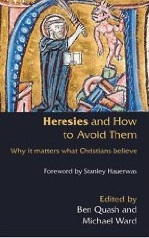
Christian perfection, so one Marguerite Porete (author of The Mirror of Simple Souls) taught, consists in annihilating one’s will and replacing it with God’s will. This French mystic was burned at the stake in 1310.
Turner discusses the ambiguity at work in typical assessments of spiritual geniuses, and he applies this to one he met: Josemaria Escriva de Balaguer. The ambiguity in the Free Spirit is the life of Porete and her sense of “perfection” in holiness. Here’s a sign of the ambiguity: her book, at the time not known to be her book, was given the imprimatur by the Cardinal Archbishop of Westminster in 1927!
Turner’s own reflections on ambiguity are among the best in this entire book. Listen to these words about how the heresy-hunt sometimes occurs: “Heresy hunters and inquisitors need combustible substance, hard and literal dry errors; damp ambiguities make poor tinder” (116). These authorities “need the fixity of boundary which ambiguities toy with.” The result? Often the heresy hunter specifies the ambiguity into fixity in order to find what they hunt.
He says of Marguerite: She is a “conscious flirt doctrinally: she eludes the very advances she elicits” (116). Her critics made her mind up for her.
What to say? (1) Critics need to work hard at letting the one they are concerned with say what they say and not say what they do not say. But, (2) those being criticized need to come clean with what they believe and what they don’t believe. I was frustrated myself with this in a recent CT interview and kept saying to myself: “Just answer the question. Charity requires it.”
Her spirituality was unchurched (in the proper sense); she was above it and beyond it and her perfection was for an elite. Ultimately, it is too good even for the common forgiveness that God offers to us in Christ.

